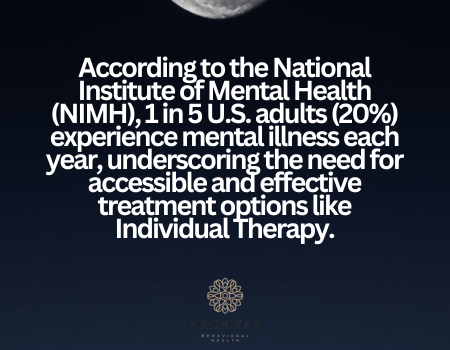Mental health recovery is a deeply personal and transformative journey, and no two individuals experience it the same way. While group settings and holistic approaches play important roles in healing, Individual Therapy—also referred to as One-on-One Therapy—stands out as a cornerstone of mental health recovery. It offers a tailored, private, and focused environment where individuals can explore their emotions, challenges, and goals with the guidance of a licensed therapist.
In this blog, we’ll explore why Individual Therapy is essential for mental health recovery, how it works, and its role in complementing other treatment modalities like Group Therapy Programs, Cognitive Behavioral Therapy (CBT), and Dialectical Behavior Therapy (DBT). A trusted mental health treatment center can provide comprehensive mental health treatment services, ensuring a holistic approach to long-term healing.
What Is Individual Therapy?
Individual Therapy involves one-on-one sessions between a therapist and a client, creating a safe and confidential space to address emotional, behavioral, and psychological challenges. Unlike group therapy, the focus is entirely on the client’s unique needs, providing a personalized approach to recovery.
Key Features of Individual Therapy:
- Personalized Care: Sessions are tailored to the client’s specific goals and challenges.
- Confidential Environment: Clients can openly share thoughts and feelings without fear of judgment.
- Focused Attention: The therapist dedicates their time exclusively to the client, fostering deeper exploration and understanding.
How Does Individual Therapy Help In Mental Health Recovery
Individual therapy, also known as one-on-one therapy, is a cornerstone of effective mental health treatment. This therapeutic approach involves a private session between the client and a licensed therapist, creating a safe and confidential environment. Here, clients can explore their thoughts, emotions, and behaviors without judgment.
At Archway Behavioral Health, we prioritize individualized care as the foundation of our comprehensive mental health treatment services. Our therapists are committed to helping clients gain insight, build coping mechanisms, and achieve lasting recovery.
Why Individual Therapy Is Essential
- Personalized Attention Individual therapy ensures that every session is designed to address your specific needs. Unlike a group therapy program, which focuses on shared experiences, one-on-one sessions dive deeper into personal struggles, offering customized solutions.
- Safe Space for Vulnerability A private setting provides the freedom to discuss sensitive issues. This confidentiality encourages openness, fostering a deeper exploration of underlying mental health concerns.
- Flexibility in Therapeutic Approaches Therapists can use evidence-based methods like CBT or DBT depending on the client’s needs. For instance:
- CBT will help you understand your negative mindset and help you replace them with thoughts that are more reassuring and positive.
- DBT focuses on emotional regulation, mindfulness, and interpersonal effectiveness, especially beneficial for those dealing with intense emotions or borderline personality disorder.
- Building Coping Mechanisms Individual therapy equips clients with tools to manage stress, anxiety, and other challenges effectively. This proactive approach builds resilience, preparing individuals to navigate life’s complexities.
Why Is Individual Therapy Key to Mental Health Recovery?
1. A Safe Space for Self-Exploration
Many individuals struggle with expressing emotions or confronting their innermost fears and insecurities. Individual Therapy provides a safe, non-judgmental space to unpack these feelings.
How It Helps:
- Allows clients to explore the root causes of their struggles.
- Encourages honest discussions about sensitive topics, such as trauma or shame.
- Fosters self-awareness, which is essential for personal growth and healing.
2. Tailored Strategies for Unique Challenges
Mental health conditions manifest differently in every individual. What works for one person may not work for another. In Individual Therapy, the therapist develops a customized treatment plan to address the client’s unique needs.
Examples of Tailored Approaches:
- Cognitive Behavioral Therapy (CBT): Helps clients identify and reframe negative thought patterns contributing to anxiety or depression.
- Dialectical Behavior Therapy (DBT): Focuses on emotional regulation, mindfulness, and distress tolerance for individuals struggling with intense emotions.
3. A Focused Environment for Goal-Setting
Individual Therapy provides an opportunity to set realistic, achievable goals for recovery. Whether it’s improving communication skills, managing anxiety, or overcoming past trauma, the therapist works with the client to create actionable steps.
Why This Matters:
- Goals provide direction and motivation throughout the recovery process.
- Progress is regularly assessed, allowing adjustments to the treatment plan as needed.
4. Addressing Trauma in a Private Setting
For individuals dealing with unresolved trauma, Individual Therapy is particularly valuable. The private nature of these sessions allows clients to explore their experiences without the fear of being judged or retraumatized in a group setting.
How Therapists Address Trauma:
- Gradual exposure to trauma-related memories in a controlled, supportive environment.
- Use of trauma-focused therapies like CBT and DBT to process and reframe traumatic experiences.
- Emphasis on building trust and emotional safety.
5. Building a Strong Therapeutic Relationship
The relationship between a therapist and client is one of the most important factors in successful mental health recovery. Individual Therapy fosters a deep sense of trust and collaboration, which can be transformative.
Benefits of a Strong Therapeutic Relationship:
- Clients feel understood and validated, reducing feelings of isolation.
- Therapists can provide direct feedback and encouragement tailored to the client’s needs.
- The relationship acts as a foundation for building healthier connections in other areas of life.
6. Integration with Other Therapies
While Individual Therapy is highly effective on its own, it also works well in conjunction with other treatment modalities offered at a mental health treatment center.
Complementary Therapies Include:
- Group Therapy Programs: Provide opportunities to build connections and gain perspective by sharing experiences with others.
- Family Therapy: Helps repair strained relationships and fosters better communication with loved ones.
- Holistic Therapies: Activities like yoga, meditation, and art therapy can enhance emotional well-being alongside Individual Therapy.
How Individual Therapy Complements Other Treatment Programs
While individual therapy is powerful, it often works best when combined with other mental health treatment services like group therapy. For example:
- Group Therapy Program: Provides a sense of community and shared understanding. It’s particularly effective for clients who feel isolated, offering a supportive network where they can learn from others’ experiences.
- Family Therapy: Helps mend strained relationships and fosters a supportive home environment, crucial for sustained recovery.
At Archway Behavioral Health, we integrate individual therapy with holistic treatment plans that include group and family therapy, ensuring a well-rounded approach to recovery.

What Conditions Does Individual Therapy Treat?
Individual Therapy is effective in addressing a wide range of mental health challenges, including:
- Anxiety Disorders: Identifying triggers and learning coping mechanisms.
- Depression: Challenging negative thought patterns and fostering emotional resilience.
- Trauma and PTSD: Processing traumatic events in a safe, controlled environment.
- Substance Abuse and Addiction: Exploring underlying causes of addiction and building healthier coping skills.
- Relationship Issues: Improving communication and resolving interpersonal conflicts.
How Individual Therapy Fits Into a Comprehensive Treatment Plan
At a trusted mental health treatment center, Individual Therapy is often part of a larger, holistic approach to recovery. Combining personalized therapy with additional mental health treatment services ensures that all aspects of a person’s well-being are addressed.
Examples of Comprehensive Treatment Plans:
- Partial Hospitalization Program (PHP):
- Includes daily therapy sessions, skill-building workshops, and psychiatric support.
- Individual Therapy plays a key role in identifying triggers and setting recovery goals.
- Intensive Outpatient Program (IOP):
- Combines structured therapy sessions with the flexibility to manage daily responsibilities.
- One-on-One Therapy is supplemented by Group Therapy Programs to promote connection and accountability.
Why Choose Archway Behavioral Health for Individual Therapy
Our mission is to empower individuals to achieve their best selves through compassionate and professional care. Here’s why we stand out:
- Highly Trained Team Our team of psychiatrists, psychologists, social workers, and counselors work collaboratively to create customized treatment plans. Their expertise ensures that every client receives the highest quality care.
- Holistic and Personalized Care Every client’s journey is unique. We listen to understand your experiences and co-develop goals to improve your well-being and quality of life.
- Comprehensive Services In addition to individual therapy, we offer specialized mental health treatment services like Dialectical Behavior Therapy, Cognitive Behavioral Therapy, and a supportive group therapy program to meet diverse needs.
- Compassionate Environment We treat every individual with dignity and respect, fostering a therapeutic relationship built on trust and empathy.
Conclusion
Individual Therapy is a vital component of mental health recovery. By offering a safe, private space for self-exploration, goal-setting, and emotional healing, it empowers individuals to take control of their mental health and build a brighter future. Whether integrated into a comprehensive plan at a mental health treatment center or pursued as a standalone treatment, Individual Therapy provides the foundation for lasting change.
If you or a loved one is ready to begin the journey to recovery, don’t hesitate to seek professional support. With the right tools and therapies—such as Cognitive Behavioral Therapy (CBT), Dialectical Behavior Therapy (DBT), and One-on-One Therapy—you can take meaningful steps toward a healthier, more fulfilling life. Take the first step today by calling us at 888.488.4103. We’re here to support you on your journey to recovery.
Frequently Asked Questions (FAQ)
How does Individual Therapy help with mental health recovery?
Individual Therapy provides a safe, confidential space to identify triggers, process emotions, and create actionable recovery goals tailored to your unique needs.
What mental health conditions can Individual Therapy treat?
It is effective for anxiety, depression, trauma, PTSD, relationship issues, and substance abuse.
How does Individual Therapy differ from Group Therapy?
Individual Therapy focuses solely on your personal experiences and goals, while Group Therapy offers a shared space for mutual support and learning from others’ experiences.
What therapeutic approaches are used in Individual Therapy?
Evidence-based approaches like Cognitive Behavioral Therapy (CBT) and Dialectical Behavior Therapy (DBT) are commonly used to address mental health challenges.
Is Individual Therapy better than Group Therapy?
Both therapies serve different purposes. Individual Therapy provides personalized attention, while Group Therapy fosters connection and shared learning. Many treatment plans combine both for comprehensive care.
How can I start Individual Therapy?
Contact a trusted Mental Health Treatment Center to connect with a licensed therapist and develop a treatment plan tailored to your needs.
Can Individual Therapy be combined with other treatment options?
Yes, Individual Therapy is often integrated with programs like Partial Hospitalization Programs (PHP), Intensive Outpatient Programs (IOP), and Group Therapy for holistic care.


